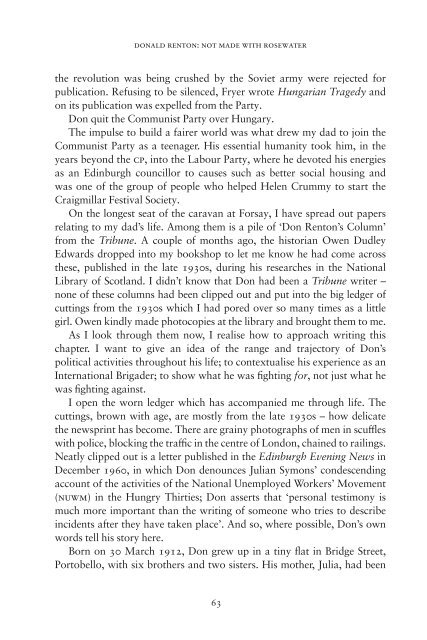Our Fathers Fought Franco by Willy Maley sampler
resonant piece of working class history, this book is a living link to four extraordinary stories. Why did these young men put their lives on the line and go to Spain to fight with the International Brigades? How did they all end up in the same prison cell? And what is their legacy today? James Maley, George Watters, Donald Renton and Archibald Williams were members of Machine Gun Company No. 2 of the XV International Brigade. This is the first book to focus on a small group of men who, from different starting-points, ended up on the same battleground at Jarama, and then in the same prisons after capture by Franco’s forces. Their remarkable story is told both in their own words and in the recollections of their sons and daughters, through a prison notebook, newspaper reports, stills cut from newsreels, interviews, anecdotes and memories, with a foreword by Daniel Gray. Our Fathers Fought Franco is a collective biography that promises to add significantly to the understanding of the motives of those who ‘went because their open eyes could see no other way’.
resonant piece of working class history, this book is a living link to four extraordinary stories. Why did these young men put their lives on the line and go to Spain to fight with the International Brigades? How did they all end up in the same prison cell? And what is their legacy today?
James Maley, George Watters, Donald Renton and Archibald Williams were members of Machine Gun Company No. 2 of the XV International Brigade. This is the first book to focus on a small group of men who, from different starting-points, ended up on the same battleground at Jarama, and then in the same prisons after capture by Franco’s forces.
Their remarkable story is told both in their own words and in the recollections of their sons and daughters, through a prison notebook, newspaper reports, stills cut from newsreels, interviews, anecdotes and memories, with a foreword by Daniel Gray.
Our Fathers Fought Franco is a collective biography that promises to add significantly to the understanding of the motives of those who ‘went because their open eyes could see no other way’.
You also want an ePaper? Increase the reach of your titles
YUMPU automatically turns print PDFs into web optimized ePapers that Google loves.
donald renton: not made with rosewater<br />
the revolution was being crushed <strong>by</strong> the Soviet army were rejected for<br />
publication. Refusing to be silenced, Fryer wrote Hungarian Tragedy and<br />
on its publication was expelled from the Party.<br />
Don quit the Communist Party over Hungary.<br />
The impulse to build a fairer world was what drew my dad to join the<br />
Communist Party as a teenager. His essential humanity took him, in the<br />
years beyond the CP, into the Labour Party, where he devoted his energies<br />
as an Edinburgh councillor to causes such as better social housing and<br />
was one of the group of people who helped Helen Crummy to start the<br />
Craigmillar Festival Society.<br />
On the longest seat of the caravan at Forsay, I have spread out papers<br />
relating to my dad’s life. Among them is a pile of ‘Don Renton’s Column’<br />
from the Tribune. A couple of months ago, the historian Owen Dudley<br />
Edwards dropped into my bookshop to let me know he had come across<br />
these, published in the late 1930s, during his researches in the National<br />
Library of Scotland. I didn’t know that Don had been a Tribune writer –<br />
none of these columns had been clipped out and put into the big ledger of<br />
cuttings from the 1930s which I had pored over so many times as a little<br />
girl. Owen kindly made photocopies at the library and brought them to me.<br />
As I look through them now, I realise how to approach writing this<br />
chapter. I want to give an idea of the range and trajectory of Don’s<br />
political activities throughout his life; to contextualise his experience as an<br />
International Brigader; to show what he was fighting for, not just what he<br />
was fighting against.<br />
I open the worn ledger which has accompanied me through life. The<br />
cuttings, brown with age, are mostly from the late 1930s – how delicate<br />
the newsprint has become. There are grainy photographs of men in scuffles<br />
with police, blocking the traffic in the centre of London, chained to railings.<br />
Neatly clipped out is a letter published in the Edinburgh Evening News in<br />
December 1960, in which Don denounces Julian Symons’ condescending<br />
account of the activities of the National Unemployed Workers’ Movement<br />
(NUWM) in the Hungry Thirties; Don asserts that ‘personal testimony is<br />
much more important than the writing of someone who tries to describe<br />
incidents after they have taken place’. And so, where possible, Don’s own<br />
words tell his story here.<br />
Born on 30 March 1912, Don grew up in a tiny flat in Bridge Street,<br />
Portobello, with six brothers and two sisters. His mother, Julia, had been<br />
63


















